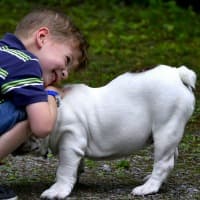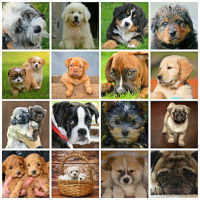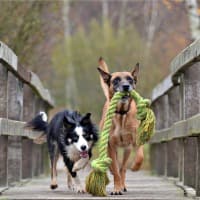FYI: If you buy something through a link on this site I may earn a commission - at NO extra cost to you.
The Best Dog Breeds For Children
The best dog breeds for children come in a variety of sizes, shapes, colors and personalities... and there's no 'one size fits all' winner.
The good news is that no matter which pooch you choose to add to your family, your kids are going to LOVE him (or her) and benefit from having a canine playmate and confidante.
There's no single, definitive list of kid friendly dogs that can tell you which dog is going to be perfect for you and your kids. But there are definitely some popular breeds which have, over time, proven that they make great family pets and the best dogs for kids will generally be found among them.
Interesting fact....
Recent research from the University of Cambridge has found that children often get along better with their canine siblings than with their human ones!
They also reap the benefits of having a non-judgmental, unconditionally loving creature to share life's ups and downs with.
This is just more evidence of the positive psychological benefits pets have on we humans lucky enough to share our lives with them.
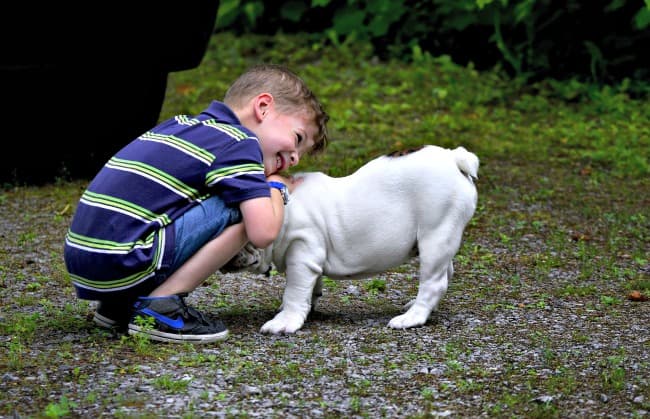
On this page I've featured the Top 10 Family Dogs according to PetMD (2020). There are many breeds NOT featured on this list and further down this page you'll find help for picking a breed according your children's age range as well as the best dogs for kids with allergies.
Quick Links:
- 10 of the best dog breeds for children
- Best dogs for families with small children
- Best dogs for kids school age and up
- Best dogs for children with allergies
- Questions to ask when choosing a dog for kids
- Taking the next steps
10 Of The Best Dog Breeds for Children
The best dogs for kids aren't always the ones that come to mind first. On this list there's something for just about every family, lifestyle and activity level.
It's important to take into account other family members, budget, living space etc. Dogs who are great with kids come in all shapes and sizes!
mixed breed dogs
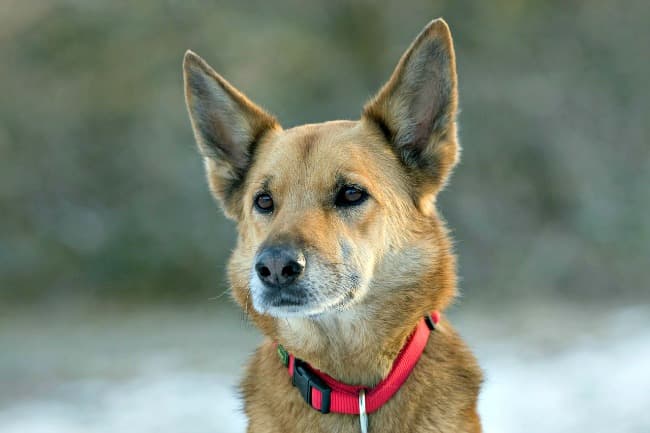
Mixed breed dogs come in all shapes, sizes and personalities, and they make wonderful family pets.
Mixed breeds are often physically healthier than purebreds and can also be less emotional or high strung.
Puppies and adults are easy to find, and many rescue organizations and shelters are full of mixed breeds who are just waiting for a family to love. Adult dog make great pets and when you adopt an adult or older dog you can skip the puppy chewing, house-training and keeping-you-up-at-night stages!
Although an 'oops litter' or a puppy from your best friend's dog can be a good place to get your new puppy, beware of back yard breeders or those who are only interested in the money. In those situations the adult dogs are usually not well cared for, and the same for the puppies. This can lead to poor health and genetic conditions which have the potential to cost money and cause heartbreak down the road.
Golden retriever
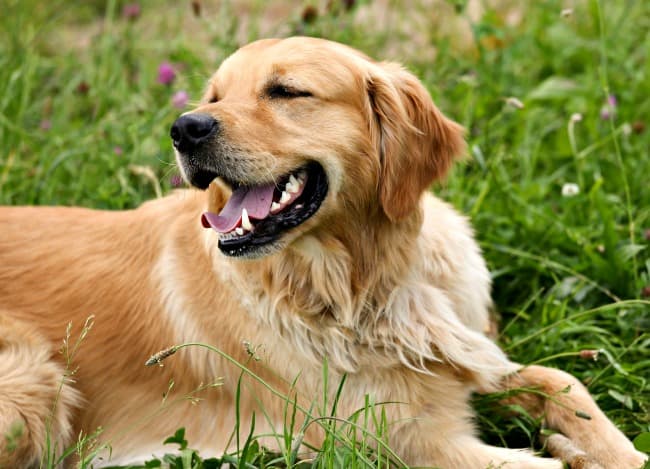
A smart, friendly, happy, easy-going dog who likes to be active and is eager to please. Patient and loving. Playful.
In addition to bone/joint issues can suffer from heart and eye problems. More...
Labrador Retriever
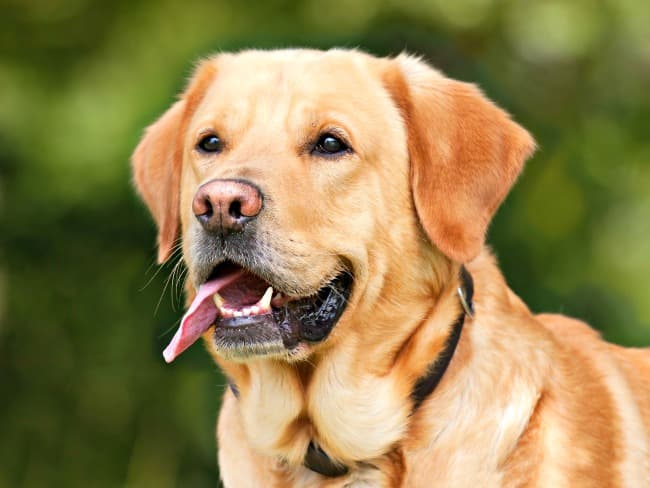
Friendly, sociable and even-tempered. Active and easy to train. Gets along with most people, dogs and pets.
Can suffer from bone/joint disorders such as hip & elbow dysplasia and arthritis when older. More...
Poodle
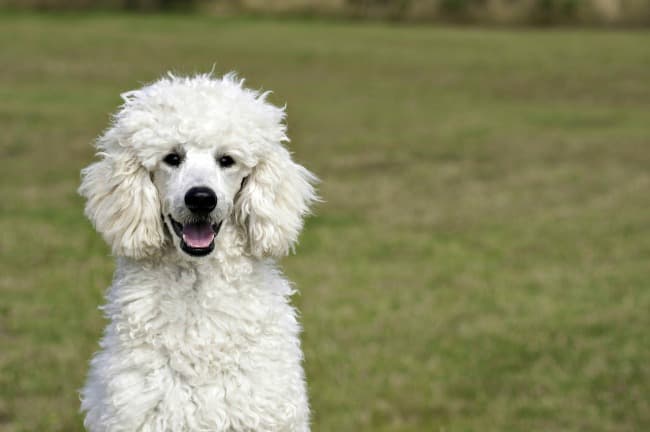
Very smart breed, quick learners. Friendly and loving, but may be hesitant around strangers. Can be anxious/nervous/prone to loneliness. Hypoallergenic coat which doesn't shed very much. Standard, miniature and toy sizes.
May develop thyroid or bone/join issues, PRA, Cushings Disease. More...
irish setter
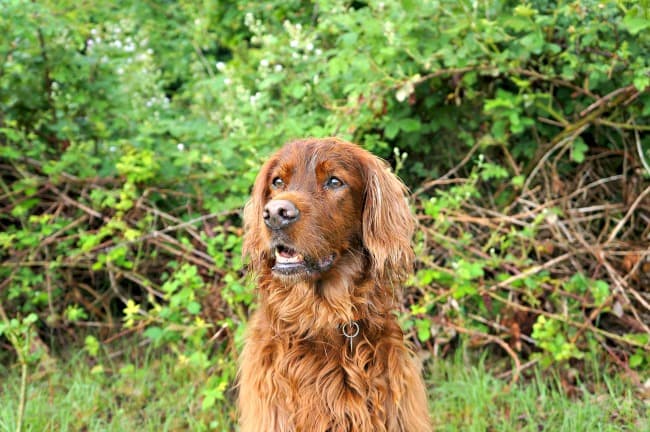
Gorgeous dog. Outgoing, friendly, lively and playful. Tons of energy and puppy playfulness even as an adult. Easy to train. Gets along well with dogs and people. Social dogs who don't like to be alone.
May suffer from eye problems, osteosarcoma and hip dysplasia.
Vizsla

Lively, happy, energetic, loving and gentle. Needs plenty of exercise. Very trainable. Can be a little sensitive/anxious at times.
May be prone to allergies, cancer, eye problems and bone/joint issues.
Newfoundland
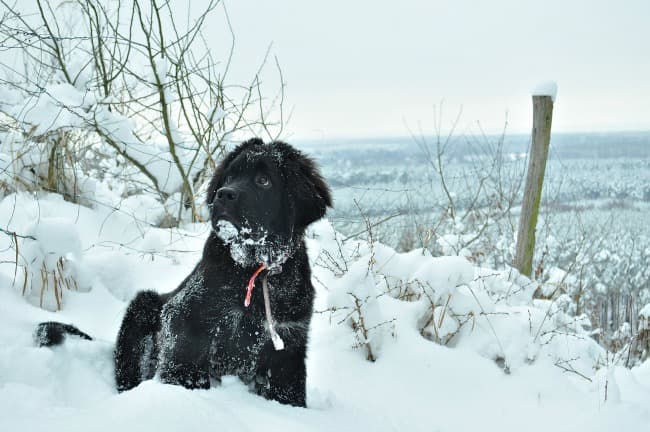
A huge dog with a big heart and a patient and gentle nature. Sweet, intelligent and trainable. Loves the water.
Definitely drools, and sheds. Can suffer from big-dog joint problems and skin issues.
Bull Terrier
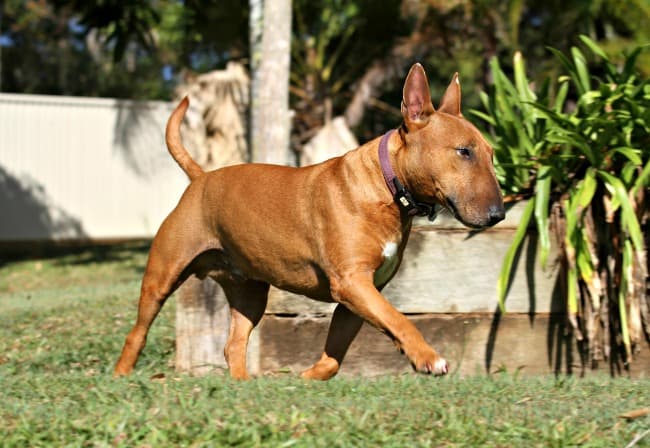
Throw away your preconceptions! This is a happy, friendly, active little dog who loves people. Does have a tendency to be bossy if not trained/socialized properly.
Can experience heart problems, skin allergies, mange and occasional deafness.
beagle
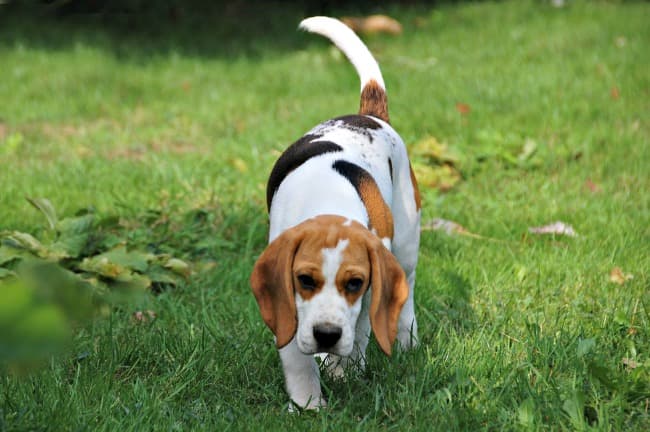
Happy, friendly, lively little dog who loves to be in on the 'action'. and will join in any kind of play with enthusiasm. Has an independent mind and can take off 'chasing a scent', so needs a fenced yard.
Pretty robust, can suffer from mange, eye problems and some bone/joint problems. More...
bulldog
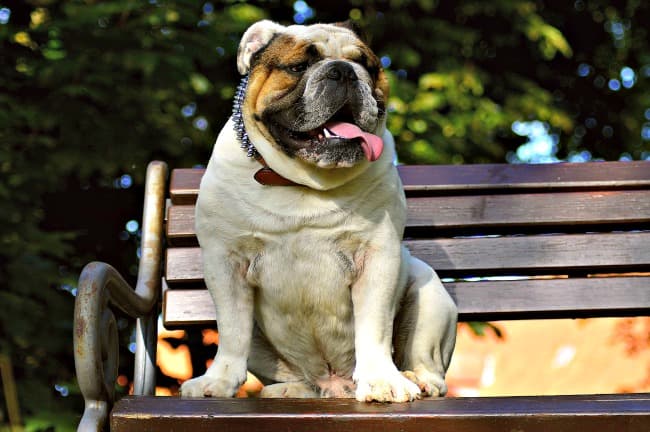
Gentle, sturdy, affectionate, not overly energetic. Gets along well with most people and pets. May be bossy with other dogs if not trained or socialized properly.
Usually snores, can suffer from skin, breathing, eye and reproductive problems. More...
Which Dog Is Best For MY Children?
When considering the best dogs for kids, it pays to remember that every pup is unique and has their own, individual personality, and that just because your new pup is of a particular breed that doesn't mean he'll be exactly like any other pup of the same breed... or even from the same litter!
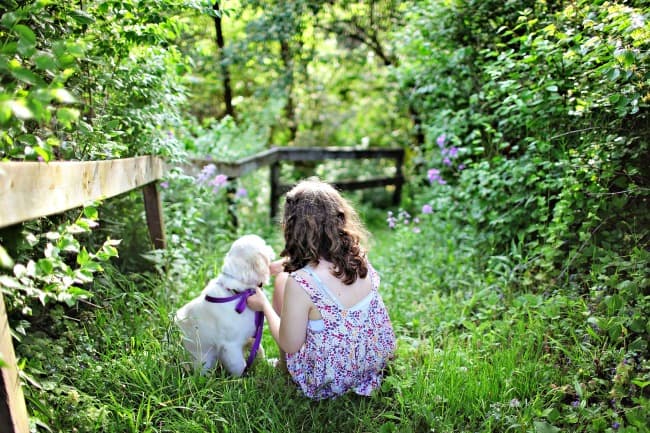
Look for a breed whose breed characteristics mesh with your family's home and lifestyle and you'll find that your two-legged and four-legged children build a happy, loving relationship that lasts a lifetime.
Although all the breeds featured above are likely to make a great pet for your family, there are lots of others that fit the bill as well.
But because all families are different, not every child-friendly breed is right for you.
To help you sort it out, here's a closer look at dog breeds and the type of family they're most likely to suit:
Best For Families With Small Children
When you're looking for the best dog breeds for children who are still toddlers, don't assume a small or tiny breed fits the bill.
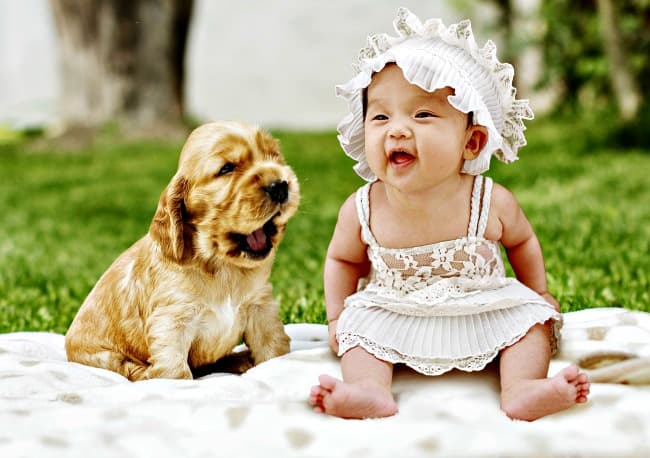
It may seem logical at first (ie small child therefore small dog), but many little dogs are very delicate and very young children can easily injure, or even kill, a tiny dog by dropping them, stepping (or falling!) on them, shutting them in a door etc.
Obviously totally accidental, but no less harmful. There are lots of different types of small dogs though, so don't rule out a breed just because it weighs less than 10lbs or so - consider the whole package.
Conversely, the very large or giant breeds aren't necessarily the best choice either.
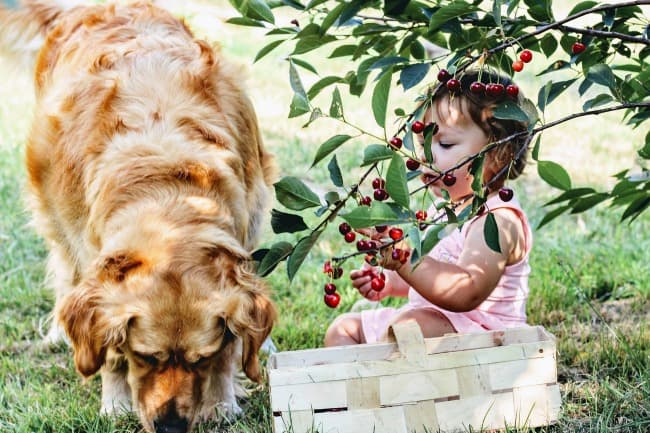
Large breed puppies are pretty sturdy and robust and the scenario above is turned on it's head, because some large to giant breed dogs are very laid back, easy going and tolerant pets but their sheer size can make them a potential hazard to very small/young children.
A Mastiff could quite easily knock down your toddler while trying to play, or say 'hello'.
Some breeds have a high prey drive, which basically means they are hardwired to chase small, fast moving animals. Toddlers are small, have high voices and can move quickly and erratically, so sometimes this can trigger prey drive in dogs who are bred for this trait. Choosing a breed that has a low prey drive and is generally calm and tolerant of other dogs, pets and small creatures is a good idea if you have little ones.
It's difficult to stop very young children from poking, prodding or pulling at a puppy, or from smothering him (perhaps literally) with hugs and kisses.
A mid-sized breed known for their calm, confident and tolerant temperament is a good choice of dog breed for children of this age. Larger breeds who are patient and calm, such as the Golden Retriever are also a good fit.
Suggested breeds might include:
- Beagle
- Boston Terrier
- Cocker Spaniel
- Corgi
- English Bulldog
- English Staffordshire Bull Terrier
- Golden Retriever
- Wheaten Terrier
Best Dogs For Kids School-Age & Up
Grade school kids are bigger, stronger and better co-ordinated than pre-schoolers plus they can understand and follow puppy-care guidelines and show empathy. All in all, choosing the best dog breeds for children of this age is quite a bit easier.
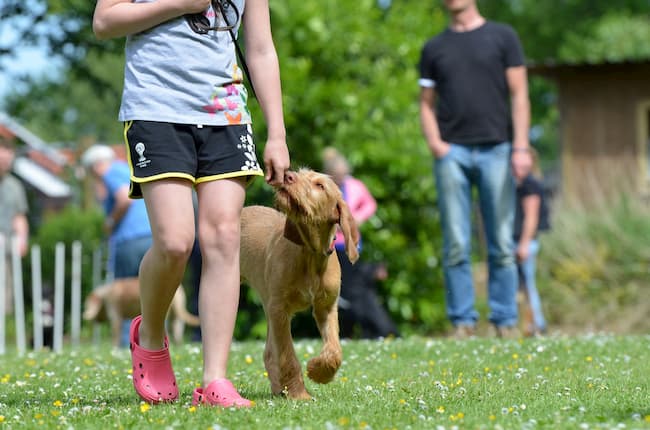
You don't need to rule out breeds on either end of the size scale, very small breeds and very large ones can both be suitable for a family with children aged from 6 - 18.
If your children are a bit older and
you have the room for a big dog there are lots of good choices, including popular breeds such Labrador Retrievers, Golden Retrievers and German Shepherds - plus those you might not see as much such as Great Pyrenees, Old English Sheepdogs, Great Danes or Mastiffs.
In this situation taking a close look at your family's activity level, lifestyle and home are the best way to make sure that you make the right decision.
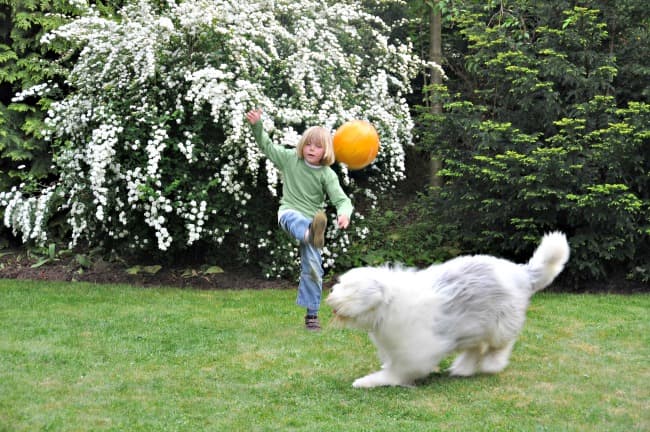
If you're active as a family and enjoy camping/hiking/fishing/bike-riding/sports/horseback-riding etc., then you should can look at fairly high-energy breeds and working dogs.
If you have grade-school to teenage children, have plenty of space and time to exercise and 'work' with a pup, and are interested in dog-related sports such as Agility, Obedience, Flyball etc., then a Border Collie puppy (or one from another energetic breed) could be the perfect match for you.
Other possibilities might include:
- Airedale Terrier
- Australian Shepherd
- Bernese Mountain Dog
- Border Collie
- Boxer
- German Shepherd
- Golden Retriever
- Irish Setter
- Jack Russell Terrier
- Labrador Retriever
- Labradoodle
- Schnauzer
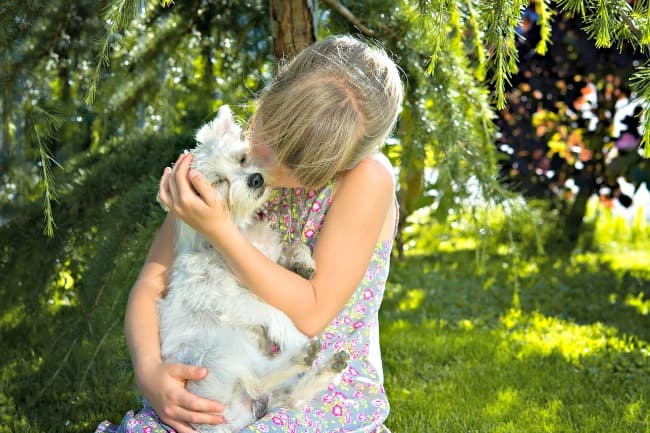
If you're a more laid-back, indoor-loving family then the lower energy breeds, or some of the smaller lap-dogs may be a better fit.
Try one of these on for size:
- Basset Hound
- Bearded Collie
- Bichon Frise
- Dachshund
- English Mastiff
- Great Dane
- Newfoundland
- Old English Sheepdog
- Poodle
- Pug
- Saint Bernard
- Shih Tzu
- Wheaten Terrier
- Whippet
- Yorkshire Terrier
Best Dogs For Children With Allergies
There's no such thing as an 'allergy-free dog', but there are certain breeds that are more suitable in this situation.
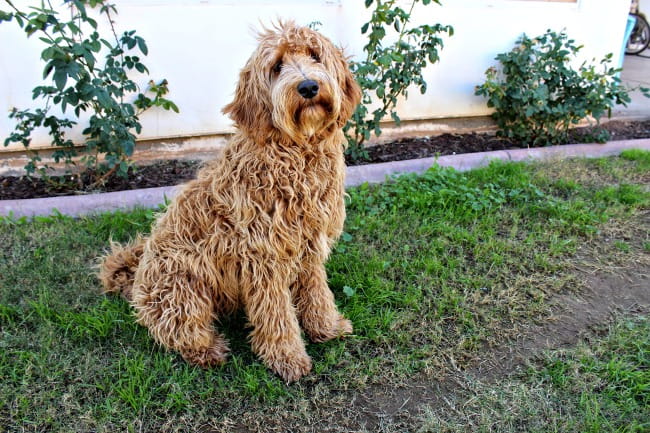
People can be allergic to dog hair, dog dander and dog saliva - so even hairless dog breeds can still trigger a reaction, but less common and less likely to be severe.
There are only a handful of hairless dogs, these include American Hairless Terrier and the Chinese Crested, but there are also more 'mainstream' dog breeds whose coat is considered to be hypoallergenic.
These include dog breeds with long silky hair, those with certain curly coats, and some hybrid or designer dog breeds.
Here are a few of the best dog breeds for children who have allergies.....
- American Hairless Terrier
- Bichon Frise
- Chinese Crested
- Cockapoo
- Coton de Tulear
- Goldendoodle
- Havanese
- Kerry Blue Terrier
- Komondor
- Labradoodle
- Maltese
- Peruvian Inca Orchid
- Poodle
- Xoloitzcuintli
- Yorkshire Terrier
To get detailed info on any of the breeds listed (and many more) just >> CLICK HERE to the American Kennel Club website
Questions to Ask When Choosing a Dog for Kids - and why to ask them!
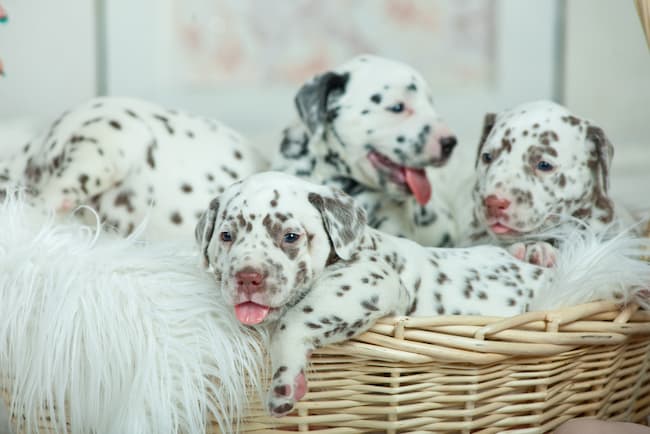
What is the energy level of this breed, or individual dog?
It's important to match a dog's energy level with that of your family and lifestyle. An overly energetic breed, especially if it's a large dog, can need a LOT of exercise and training and often fits best with a family who likes to be active and has time to walk, exercise and train him properly.
Does this breed or dog have a high, or low prey drive?
Dogs with a high prey drive are hard-wired to chase, and often catch, small and fast moving creatures. Small children can sometimes instinctively be seen that way by these breeds with this trait. It takes early and consistent training to make sure your pup or dog learns NOT to chase the kids.
How 'mouthy' (ie nippy) is this breed/dog?
Some breeds are more likely to nip/bite than others. Herding dogs are among the nippiest of all, because that's how they control flocks and herds and it's instinctive. You can most definitely train any dog not to nip and bite but it takes time and patience, plus consistency. During the learning process the nipping can hurt.
Is this breed easy to train and eager to please?
Some breeds are eager to please and quick to learn, others are independent or stubborn. All of these characteristics are inbred depending on the original use of the breed and all dogs can be trained, but some are easier and quicker studies than others. This doesn't mean a stubborn or independent pup/dog isn't as smart as his trick-acing buddy, just a different type of dog!
Is this puppy or dog used to being around, and held by, children?
Puppies raised around children aren't going to be scared or overwhelmed by family life, but even if they haven't been exposed to kids, most young puppies will adjust quickly. Adult dogs can be a different story, so get the background on any adult dog you are adopting or buying and if at all possible have him/her meet your children before finalizing the process. It's rare for a dog to be aggressive with kids, but a scared, anxious or overwhelmed dog in a new environment can get nippy or defensive. So supervision is always important.
How social and friendly is this dog/puppy?
If you have a busy social family life you want a dog who will be happy with that too. Some breeds are naturally wary of strangers and protective of home and family, this is fine and can be managed in any situation, but it adds an extra level of work and training to make sure everyone is safe. A breed who is usually happy, outgoing and accepting of other animals and people can be the easier route.
Is this puppy/dog anxious, nervous or wary of strangers/new things?
Any puppy or dog is going to be anxious, homesick and likely scared for the first few days in a new home. That's totally normal. But if he is a confident, happy puppy or dog he'll come out of his shell quickly. However, every dog is a different personality and a puppy or dog who is naturally anxious, nervous or shy can take longer to warm up and needs careful, slow and loving attention to help him feel safe and secure. Children need to give him space and time to do this or if he feels cornered of overwhelmed he may growl or snap as a natural way to protect himself.
Got A Shortlist? Help With The Next Step
I've tried to find something for everyone on this page, so if you've managed to find your favorite kid-friendly dog breed (or a shortlist of several potential 'winners') it's now time to move on to searching for that perfect puppy!
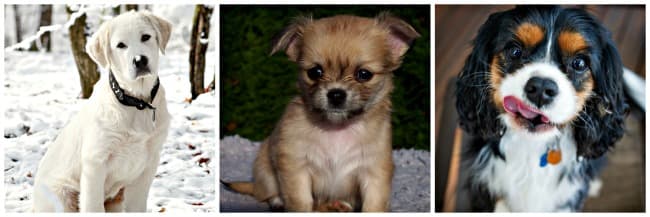
Here are a few tips and hints to help you on your way................
It's always important to be sure to buy your puppy from a reputable breeder and always try to see the parents of the puppies to be sure that they're sound physically and temperamentally.
Then you need to know how to pick the right puppy and how to recognize a healthy puppy so that you don't take home one who is sick... that's a recipe for heartbreak all around.
If you're a first-time puppy parent (or it's been a while!) you might be a little unsure of what to expect during the first few days.
Visit my Bringing Home A New Puppy page to make those early days easier, and less worrying.
Don't forget that there are also tons of wonderful dogs (and pups) in shelters and pounds across the country, who desperately need new homes and families of their very own.
Learn about puppy and dog adoption and consider it if you can, you will literally be saving a life. These dog rescue organizations are a great place to start.
Remember that adult dogs can also make excellent pets for kids too. They have the added benefit to you of skipping the house-training, chewing everything and running amok puppy stage!!
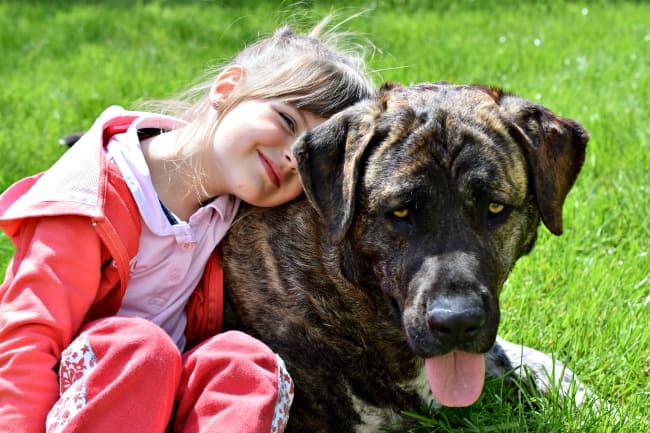
If you're planning to add a new dog to your family (or already have!) here's a really useful book will help you get everyone on the same page:
Raising Puppies and Kids Together
This is a great 'Puppy Owners Manual' for anyone who has kids and is wanting to add a dog to the mix (or vice versa!).
An easy to follow, reader-friendly guide which covers all the basics.
Including showing new puppy owners how to learn about dog behavior, how to communicate with and socialize their new family member.
Choosing
the best dog breed isn't the only task if you're adding a
new pup to your home, this book will guide you through the next stages.
Recommended!
There are lots more excellent books that can help you and your kids prepare for dog ownership, and also explore training methods, tricks and other fun stuff including
Kids and dogs can make the very best partners, but it's up to us as parents to help them all learn how to show love and respect to each other.
you might also like...
- Home
- Dog Breed Information
- Best Dog Breeds for Children
FTC Disclosure: Some pages on this site contain affiliate links. I may earn on qualified purchases.
